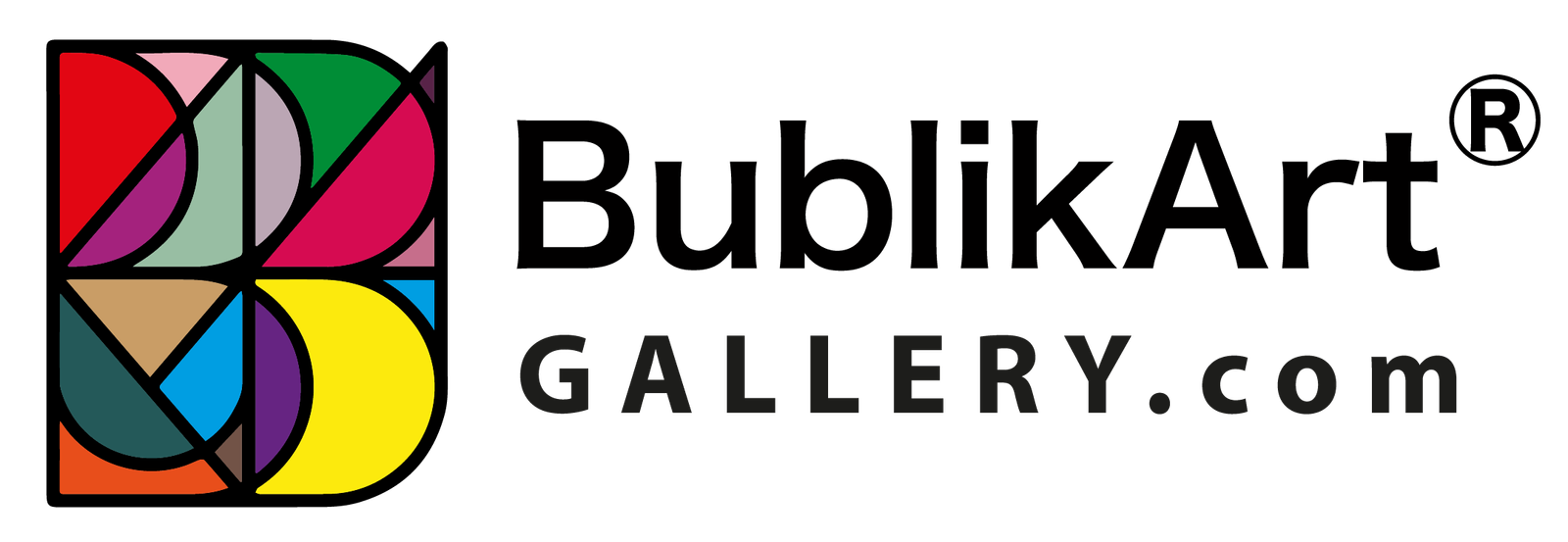Based in San Diego, California, we went to meet Victoria Stagni for a total immersion in her artistic world. An enthusiast of self-portraits and portraits featuring mainly women surrounded by animals, and a great fan of the Douanier Rousseau and Frida Kahlo, Victoria Stagni confided in us with warmth.
By Cécile Martet | 04 Jan 2024
Hello Victoria, thank you for having us over! To begin with, let’s talk about your desire to become an artist…
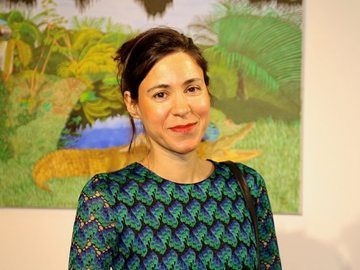
As a teenager and young adult, I used to draw a lot but I couldn’t imagine making a career out of it. However, I grew up in an environment with a strong artistic influence as both of my parents were architects.
It took me several years before I allowed myself to become the person I really wanted to be from the beginning: a creative. But more specifically, a fine art painter. I felt everything falling into place when I left Paris for Bordeaux, almost eight years ago. I came across a forgotten easel in the cellar and it appeared to be waiting for me, almost like an invitation. There is a very special atmosphere in Bordeaux, it’s an environment that stimulates the imagination and gives you the keys to a creative escape…
What was your background before settling in Bordeaux?
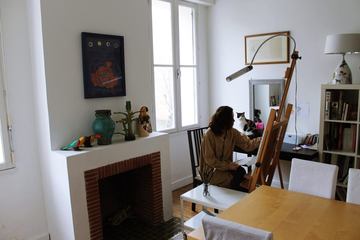
After highschool I studied history at the Sorbonne, then went on to study Communication without asking myself too many questions. I then had an apprenticeship in drama at the Cours Florent. This was the first important turning point in my life.
After that, I was an actress for almost 10 years. I thought I had found my way but I gradually realized that I wasn’t satisfied due to the lack of creative freedom. On that note, I left Paris and came to Bordeaux. I enrolled in Pierre Lafage’s painting course at the Studio of Fine Arts and quickly started carrying out work that was close to my heart. As you can imagine, I had built up a huge desire to express myself on canvas.
For two years now, I’ve been living in California, in San Diego, right next to the sea. I can walk there every day and this daily closeness to nature is a real source of contemplation and inspiration for me.
Are there any artists who have inspired you and still inspire you today?
I love the naive and dreamlike compositions of Henri Rousseau, the way he paints nature and animals in a wonderful medley of colors. As for Frida Kahlo, it is of course for her self-portraits that I love her so; especially those in the presence of animals – they are just stunning. I love it when she fully embraces the whole of her Mexican identity. She looks you in the eye and is no longer a woman with a cursed fate. She is powerful, she is free.
I deeply admire the greats like Camille Claudel and Rosa Bonheur, I find their work to be just tremendous. I think their personalities just shine straight through their art, too. I also particularly admire the audaciousness and sheer pugnacity of these free spirited women, who were fighting for their independence in a man’s world.
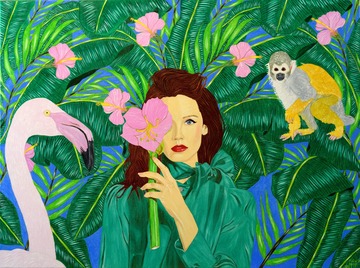
Camille Claudel refused to accept her role as just a mere disciple of Rodin and was intent on creating her own singular style, based on passion and sensuality, by distancing herself from the artistic movements of her time. Rosa Bonheur just followed her instincts and her desire to create, inspired by the wonders of the animal kingdom.
As for Klimt, he is a man who knows how to represent women. He celebrates their beauty and succeeds in making them desirable while also preserving their dignity. It’s a perfect representation of the eternal woman in my opinion. I’m also obsessed with his use of the color gold.
Closer to home, I also really appreciate some of David Hockney’s realistic works for his use of color and the somewhat strange aura around his subjects. I also think of Banksy whose politically-charged works highlight the plagues caused by man. They really touch me.
What are the main themes in your work and why?
The concept of dreaming is one of the main themes that runs through almost all my paintings. This is without a doubt linked to the magical realism drawn from the Latin American stories of my childhood…
And then there’s the love for nature and animals; all of which I find fabulous and fascinating. I claim my own “animality“ in my self-portraits. I feel a sort of sisterhood that should unite us with the rest of the animal kingdom instead of forever turning us away from it.
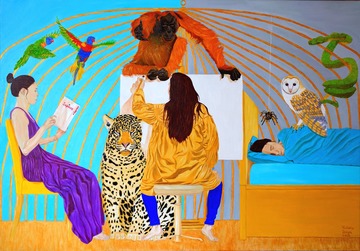
Many of my paintings are clearly pleas against pollution, environmental destruction and more generally, calls for the preservation of nature. Some can even take a more political spin. Of course, I paint almost exclusively women. The First Peoples or indigenous populations are also an important source of inspiration.
In what way does feminism play a key role in your approach to art?
My work can be seen as depicting women who evolve in an almost dreamlike world, where they appear to be free, independent, powerful but also sensitive and vulnerable at the same time… A world where they thrive perfectly well without the presence of men and their destructive domineering tendencies.
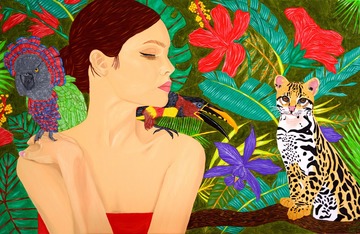
And finally, there is fear. There are often disturbing elements and threats that hover in my paintings. It can obscure a more joyful first impression brought on by the bright colors.
My fear is ever-present. I have inherited a deep sense of insecurity due to my experience as a young girl. At the age of four I had to flee my country at a moment’s notice. There was no explanation. I have since been burdened with my parents’ anguish in the face of a possible imminent death. The Argentinean military dictatorship has had this dark influence on my work.
The majority of your paintings are commanded by your presence. Why is that? On what occasions do you paint other people?
With self-portraits there is a lack of accountability to anyone but yourself! On the canvas, your image belongs to you. You can therefore use it as you please. It is also the best way to convey emotion and to lay out my ideas onto the surface of the canvas.
I have made several portraits of women who are more or less close to me. But in these cases, however, I was dispossessed by not having the total pictorial freedom I’m used to. I also worry about how they would perceive my creations. Furthermore, I have depicted my two daughters on several occasions, but yet again, I still have a responsibility to the model.
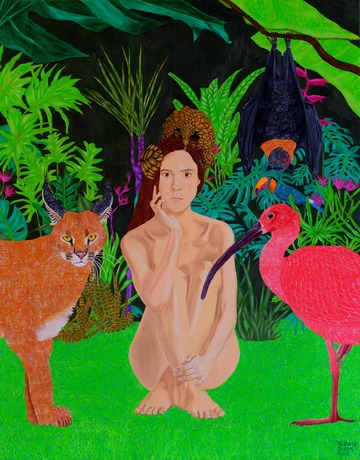
Lately, I have only used young female models from the other side of the world for my “Sanctuaries” series. I feel a similar freedom here as I do when painting myself since they are anonymous.
Among all your self-portraits, is there one that represents you more than the others?
I don’t know if there is one self-portrait in particular that best represents me…They capture so many facets of my personality, snapshots of how I feel about the reality that surrounds us. You’ve probably noticed that I often choose to represent myself naked. There’s actually nothing erotic there.
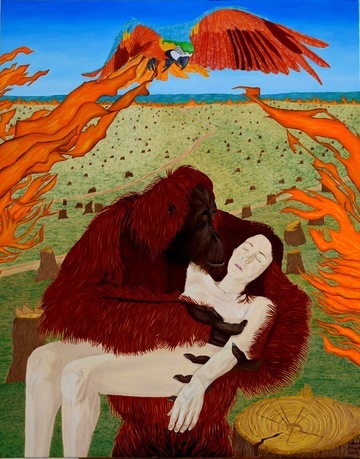
We feel extremely vulnerable in a strange context or an unusual environment and are unable to do anything about it. This is perhaps where I recognize myself the most. So, perhaps I would have to say Les Augures or Borneo.
Do you think that being a female artist can be considered an opportunity or a burden?
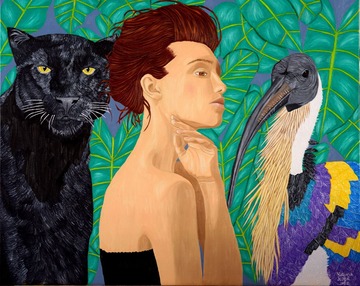
I definitely think that it’s an opportunity, yes! I feel very fortunate to be in the place that I am. There’s been a gradual shift in society over the last few years and women are slowly but surely starting to make their voices heard. Just look at the music world; there are more and more women becoming huge, global superstars nowadays, almost on par with the number of male ones out there!
